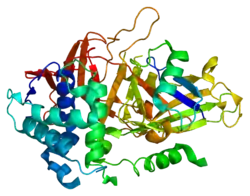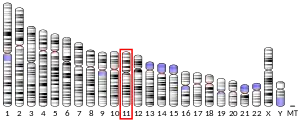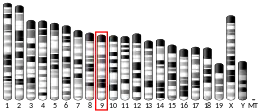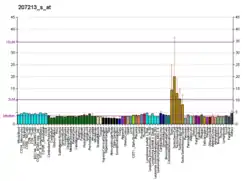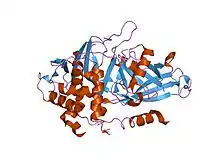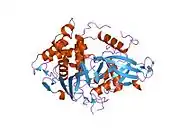USP2
Ubiquitin carboxyl-terminal hydrolase 2 is an enzyme that in humans is encoded by the USP2 gene.[5][6]
Ubiquitin (MIM 191339), a highly conserved protein involved in the regulation of intracellular protein breakdown, cell cycle regulation, and stress response, is released from degraded proteins by disassembly of the polyubiquitin chains. The disassembly process is mediated by ubiquitin-specific proteases (USPs). Also see USP1 (MIM 603478).[supplied by OMIM][6]
References
- GRCh38: Ensembl release 89: ENSG00000036672 - Ensembl, May 2017
- GRCm38: Ensembl release 89: ENSMUSG00000032010 - Ensembl, May 2017
- "Human PubMed Reference:". National Center for Biotechnology Information, U.S. National Library of Medicine.
- "Mouse PubMed Reference:". National Center for Biotechnology Information, U.S. National Library of Medicine.
- Puente XS, Sanchez LM, Overall CM, Lopez-Otin C (Jul 2003). "Human and mouse proteases: a comparative genomic approach". Nat Rev Genet. 4 (7): 544–58. doi:10.1038/nrg1111. PMID 12838346. S2CID 2856065.
- "Entrez Gene: USP2 ubiquitin specific peptidase 2".
Further reading
- D'Andrea A, Pellman D (1999). "Deubiquitinating enzymes: a new class of biological regulators". Crit. Rev. Biochem. Mol. Biol. 33 (5): 337–52. doi:10.1080/10409239891204251. PMID 9827704.
- Baek SH, Choi KS, Yoo YJ, et al. (1997). "Molecular cloning of a novel ubiquitin-specific protease, UBP41, with isopeptidase activity in chick skeletal muscle". J. Biol. Chem. 272 (41): 25560–5. doi:10.1074/jbc.272.41.25560. PMID 9325273.
- Strausberg RL, Feingold EA, Grouse LH, et al. (2003). "Generation and initial analysis of more than 15,000 full-length human and mouse cDNA sequences". Proc. Natl. Acad. Sci. U.S.A. 99 (26): 16899–903. doi:10.1073/pnas.242603899. PMC 139241. PMID 12477932.
- Gewies A, Grimm S (2003). "UBP41 is a proapoptotic ubiquitin-specific protease". Cancer Res. 63 (3): 682–8. PMID 12566314.
- Ota T, Suzuki Y, Nishikawa T, et al. (2004). "Complete sequencing and characterization of 21,243 full-length human cDNAs". Nat. Genet. 36 (1): 40–5. doi:10.1038/ng1285. PMID 14702039.
- Bouwmeester T, Bauch A, Ruffner H, et al. (2004). "A physical and functional map of the human TNF-alpha/NF-kappa B signal transduction pathway". Nat. Cell Biol. 6 (2): 97–105. doi:10.1038/ncb1086. PMID 14743216. S2CID 11683986.
- Graner E, Tang D, Rossi S, et al. (2004). "The isopeptidase USP2a regulates the stability of fatty acid synthase in prostate cancer". Cancer Cell. 5 (3): 253–61. doi:10.1016/S1535-6108(04)00055-8. PMID 15050917.
- Gerhard DS, Wagner L, Feingold EA, et al. (2004). "The Status, Quality, and Expansion of the NIH Full-Length cDNA Project: The Mammalian Gene Collection (MGC)". Genome Res. 14 (10B): 2121–7. doi:10.1101/gr.2596504. PMC 528928. PMID 15489334.
- Rual JF, Venkatesan K, Hao T, et al. (2005). "Towards a proteome-scale map of the human protein-protein interaction network". Nature. 437 (7062): 1173–8. doi:10.1038/nature04209. PMID 16189514. S2CID 4427026.
- Stevenson LF, Sparks A, Allende-Vega N, et al. (2007). "The deubiquitinating enzyme USP2a regulates the p53 pathway by targeting Mdm2". EMBO J. 26 (4): 976–86. doi:10.1038/sj.emboj.7601567. PMC 1852834. PMID 17290220.
This article is issued from Wikipedia. The text is licensed under Creative Commons - Attribution - Sharealike. Additional terms may apply for the media files.
